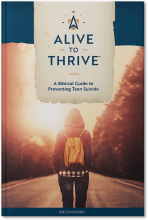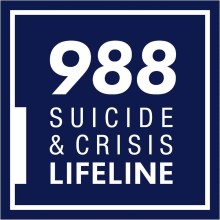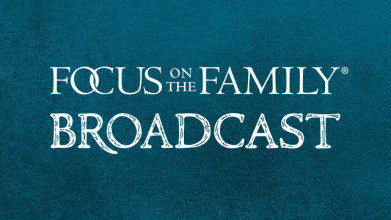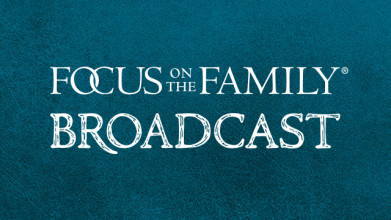Sarah J. Robinson: Maybe you’ve tried to talk about it and the people you’ve talked to haven’t responded well. That’s not because of you. That’s not your fault. You need help and you are worthy of it. You are worth everything it takes to get better, so keep trying.
John Fuller: Sarah Robinson, describing her journey of finding help and learning to trust in God through her struggle with depression and suicidal thoughts. She joins us today on Focus on the Family. And your host is Focus president and author, Jim Daly.
I’m John Fuller, and let me note that, uh, you’ll hear some mature themes in today’s program. So please, listen with earbuds or listen later either online or through our app if you’ve got younger children nearby.
Jim Daly: John, we discussed some, um, raw but very real topics in yesterday’s broadcast. Sarah shared her story of having suicidal thoughts that started when she was just a child and how they developed into serious depression, and anxiety as an adult. She explained how vulnerability was so important as she began to share with family members and friends about the struggles that she was having. We also discussed how God met her where she was and how she learned to bring her unhealthy thoughts to him. Today we’re going to learn more about her story as well as how to recognize the signs of depression in those around you.
John: And you can hear or watch the first part of this conversation online. Check it out at focusonthefamily.com/broadcast.
Sarah Robinson has experienced working in a residential facility for young women with severe mental health issues, and a decade of youth and young adult ministry. She’s also written a book called, I Love Jesus, But I Want to Die: Finding Hope in the Darkness of Depression. You could learn more about the book and our guest at focusonthefamily.com/broadcast.
Let’s go ahead and continue the conversation now. Here’s Jim Daly and Sarah Robinson.
Jim: Sarah, whoo, man I had to take a deep breath and I’m so glad we’re able to continue the discussion. Thanks for coming back for a second day.
Sarah: Thanks so much for having me.
Jim: You describe the fear-tension-pain cycle.
Sarah: Mm-hmm.
Jim: I think that’s a birth, that’s a new one on me. We have two-
Sarah: Yeah.
Jim: … boys, but I haven’t heard this-
Sarah: (laughs)
Jim: … one yet. But what is that, fear-tension-pain cycle and how did it apply to your emotional wellbeing?
Sarah: So I’ve actually now, uh, you know when I wrote the book I hadn’t had a child yet, now I have a 20-month-old toddler.
Jim: So you’ve been through the process.
Sarah: Been through it. Been through it.
Jim: (laughs)
Sarah: Um, so there’s this idea in kind of the natural, unmedicated childbirth world that a lot of the pain that is experienced in childbirth is because we get scared and then we tense up. So any time you’re afraid, imagine, you know-
Jim: Right.
Sarah: … you’re driving your car and you think you’re gonna rear end somebody, your whole body tenses.
Jim: Right.
Sarah: Um, that creates physical pain. And then you get scared because you’re in pain, and then you tense more, et cetera, et cetera. Um, just like we talked about fear being a signal earlier, so is pain. Our bodies are designed to experience pain to tell us something’s wrong. You stepped on a nail, move your foot.
Jim: Right, it’s an alert system.
Sarah: Yes, it’s an alert system. Um, but when we hyperfocus on our pain, it just increases it. And so, emotionally what you’re experiencing is kind of, you know, a word we might use in counseling would be like, catastrophizing. Like, “Oh, this is so horrible, it’s never gonna get better.” And then you kind of tense up, and then you hurt more. And it just gets like this negative spiral of going to a really dark place. Where instead, if you kind of lean into the pain, if you lean in, in labor if you lean into the contractions, you know this is going to be hard work, um, it can lessen the pain.
Jim: Yeah, make it a little easier.
Sarah: Make it a little easier. Now, when I was in labor, I did have some significant pain, because there was something wrong. And I’d done a lot of work to kind of deal with the fear that I might’ve experienced, and so when there was that signal that something was wrong, we could actually deal with it and get the help that we needed.
Jim: Yeah.
Sarah: And so, kind of leaning into your anxiety, this sounds so counterintuitive, especially-
Jim: No, I get it.
Sarah: … for people of faith, you know, because we’re supposed to flee the darkness, right? But I felt this invitation at one point from God to just kind of sit in the darkness.
Jim: Hmm.
Sarah: And I was like, “Nope. Big fat nope, God, that is not happening-”
Jim: Yeah.
Sarah: “… because that’s not what I’m supposed to do.” But when I kind of learned to kinda drop the tug of war rope and stop fighting against it, and sit in my pain, and find a good therapist who could help me in that process that God was inviting me into, I was able to experience the depression and the anxiety in a way that wasn’t so catastrophic, and wasn’t so frightening.
Jim: Yeah, the yoke was easier.
Sarah: Yeah, the yoke was much easier.
Jim: That’s interesting.
Sarah: It wasn’t gone, but it was easier because I was allowing God to bear it with me, um, you know the whole point of that-
Jim: Yeah.
Sarah: … verse, “My yoke is easy,” you’re yoked with me and walking in step with me. And so, sometimes when we fight and fight, and fight, and fight it doesn’t actually create the outcomes we want. What we-
Jim: Right.
Sarah: … sometimes need to do is say, “I’m having a- a bad day. I’m having a dark day. I’m having, um, dark thoughts. I feel really anxious today. Oh, there you are again depression. There you are again anxiety. You can come along for the ride. You’re not gonna drive the bus, but you can come along for the ride-”
Jim: Huh.
Sarah: “… and we’re gonna get through this, because-”
Jim: Yeah.
Sarah: “… God is with me and the people I love are with me, and my support team is with me.” And for me, I have, um, episodes of depression that tend to come back. And so, I know they tend not to last forever.
Jim: Yeah. In that context, something you said earlier, I just wanna come back and-
Sarah: Yeah.
Jim: … kinda let you expand on that. And that is that deep well that felt bottomless.
Sarah: Mm-hmm.
Jim: I would think what you’re describing there is, that no longer is true, that you can identify those things the way you just did-
Sarah: Mm-hmm.
Jim: … and it makes that well not as deep, perhaps. That’s how I would infer what you were saying. Is that fair?
Sarah: I think that’s fair with a couple of caveats. It’s been a lot of work to get to-
Jim: Yeah.
Sarah: … that point.
Jim: Oh, yeah.
Sarah: And for me that work has involved a lot of therapy and it involves medication I take every day.
Jim: Yeah.
Sarah: And that doesn’t make me happy, it brings my lows up. So instead of it being this bottomless pit, it, you know, kind of fills in the bottom.
Jim: Right.
Sarah: So my rock-bottom now is not anywhere as deep as it used to be.
Jim: Yeah.
Sarah: And I still feel, on my bad depression days, it’s this gnawing emptiness inside. And it’s a hard thing to describe, but I physically feel it in my chest. Or I might feel like there’s a rock on my chest. It’s very physical. People don’t-
Jim: Yeah.
Sarah: … often understand that depression isn’t just a mental illness, it’s a physical illness. And so I still feel it. But knowing it’s not gonna last forever. Knowing the things I can do to cope in my darkest moments. Knowing I don’t need to push through today, I need to be a little gentle with myself. I need to, you know, listen to some good music. I need to watch a show that’s gonna make me laugh. I need-
Jim: Right.
Sarah: … to tickle my toddler. I need to ask my husband for a long, long hug. Um, those things are going to help fill in the bottom.
Jim: Right.
Sarah: And then if I can, get a little bit of extra time alone with God to remind myself of what’s good and true, and to allow myself to hear the voice of love, and the voice of God with us in scripture, in worship, and in prayer.
Jim: Yeah. Let me, let me ask you, um, that sense of community, having people around you. You’ve referenced it a couple of times. Family, of course your husband-
Sarah: Mm-hmm.
Jim: … and your child, that’s, that brings you some, probably, uh, you know with your child, just joy.
Sarah: Yes.
Jim: And then with your husband it may be kind of a whole bailiwick of (laughs) things.
Sarah: (laughs)
Jim: I don’t know. ‘Cause I… You know, Jean struggles with this too and she’s been on the broadcast and she’s talked about this. And her family has struggled a lot-
Sarah: Mm-hmm.
Jim: … um, with depression, anxiety. And, um, sometimes for the conflict between us, for me I’m not always responding properly. And I, you know, I’m embarrassed to say that, but sometimes I just I wanna, let’s just go. Let’s pick up ourselves by our bootstraps-
Sarah: Yeah.
Jim: … and go. I remember after a catastrophic event in her family she just looked at me and said, “You know what? Not everybody’s wired like that.”
Sarah: Yeah.
Jim: “I can’t do that.” And it actually scared me-
Sarah: Mm.
Jim: … ’cause I didn’t know what to do with that.
Sarah: Right.
Jim: You know, this is my coping mechanism.
Sarah: Right.
Jim: … pack it away, let’s go, get up tomorrow, we gotta conquer the hill.
Sarah: Yeah. Now you want me to sit in this pain?
Jim: Sit, yeah. Whoo, that-
Sarah: No, thank you.
Jim: … I mean it even makes me feel anxious thinking about that.
Sarah: Absolutely.
Jim: So it’s kind of a weird kind of continuum, right?
Sarah: Mm-hmm.
Jim: Some of us on this end saying, “Forget it, let’s go,” and others saying, “I can’t, I can’t let it go.”
Sarah: Yeah.
Jim: “I gotta sit here until I feel like I can get up and go.”
Sarah: Yeah.
Jim: How do you reconcile that, maybe even with your own husband? Is he wired differently, like Jean and I?
Sarah: He is wired differently. He had… Before we met he had some experience, um, traveling with an organization that did a lot of school assemblies with the family of, um, Rachel Scott, who was killed in Columbine.
Jim: Oh, yeah.
Sarah: And so, he had a lot of experience with, you know, crying kids coming up to him after the assembly saying, you know, “I was suicidal,” or, “I’m being abused,” or, “Here’s-”
Jim: My goodness.
Sarah: “… my plan for a school shooting.” And so even though he’s wired very differently, he had enough experience with people in a very different frame of mind, that he kind of knew at least how to respond on the surface. And then over time he’s just really asked good questions-
Jim: Mm.
Sarah: … and been really open to-
Jim: So intentional.
Sarah: He’s been very intentional.
Jim: Yeah. That’s good.
Sarah: Yeah. And also, as, you know, on the flip side, I think this is something that maybe isn’t talked about enough. As the partner of somebody who struggles with mental illness, he has been honest with me about, “Hey, I know you’re struggling, but you know, in those times when you do this, this hurts me in this way. Or like when you’re anxious or panicking, you know, it impacts me this way.” And so it’s not just, you know, he’s the rock and-
Jim: Right.
Sarah: … takes care-
Jim: Exactly.
Sarah: … of me, it’s learning for both of us to manage our expectations for one another, and to walk together in a way that’s loving and considerate.
Jim: Well and that open communication-
Sarah: Yes.
Jim: … you also mention in the book the need for knowing the safe person-
Sarah: Yes.
Jim: … in your life, and maybe there’s more-
Sarah: Yes.
Jim: …. than one. But that kinda gets in that direction, right-
Sarah: Absolutely.
Jim: … who is that safe person who I could talk with and be with? And hopefully that’s your spouse, but-
Sarah: Yeah.
Jim: … not always.
Sarah: It’s not always. And you know, I was blessed enough to already be on my healing journey and have gone through a lot of this when I met Micah. Um, Safe People is by Cloud and Townsend, the same authors who wrote Boundaries, another-
Jim: Yeah.
Sarah: … fantastic book.
Jim: Good friends. (laughs)
Sarah: Awesome. Awesome.
Jim: Yeah, they’re good- good guys.
Sarah: Um, and you know, there’s just so many tips and tricks in there. But for me the big thing is, if you observe somebody before you dump your life story on them, you can tell.
Jim: Mm-hmm.
Sarah: You can tell if they’re- they’re a safe person. So, you know, in your workplace, who’s gossiping and who doesn’t talk about other people? Because if they’re gossiping about someone else, they’ll gossip about you.
Jim: Correct. Right.
Sarah: Who is really quick to change the subject when something hurtful or sad comes up? And who responds well?
Jim: Mm.
Sarah: You know, if you share something more minor in your life, say you’re trying out a small group for the first time and you share, you know, a minor job worry. Are people, um, encouraging and concerned, and legitimately praying for you, or are they doing what we call spiritual bypassing, which is just like, “Well God’s gonna bless you”? Or-
Jim: (laughs) Right.
Sarah: … you know, too blessed to be stressed kind of thing.
Jim: Spiritual bypassing-
Sarah: Yeah.
Jim: … I love that.
Sarah: Yeah.
Jim: I’ve never heard that term.
John: Mm-hmm. This is Focus on the Family with Jim Daly and our guest is Sarah Robinson. And she’s describing how to find safe people in your life when you’re struggling with depression or suicidal thoughts. And Sarah has written a very real book in which she shares her story and her heart for those going through this kind of thing. It’s called, I Love Jesus, But I want to Die: Finding Hope in the Darkness of Depression. That book is available at focusonthefamily.com/broadcast. Or call 800, the letter A, and the word FAMILY.
Let’s continue now as Jim Daly talks with Sarah Robinson.
Jim: You, in the book you use the story of Daniel to illuminate something I- I don’t think most people would catch. What- what is that connection that you caught from the fiery furnace of Daniel and his friends.
Sarah: Yeah. So Shadrach, Meshach, and Abednego, you may know the story from like Veggie Tales or-
Jim: (laughs) Yeah, right.
Sarah: …flannelgraph, or whatever in Sunday school. And the king of Babylon has set up this golden idol. And, you know, when they play all the music everyone has to bow down, and worship it, and pray to it. But Shadrach, Meshach and Abednego are Israelites in captivity and they’re not gonna do it. And so this is essentially a trap laid for them by the Babylonian officials. And so, they- they don’t do it, and they’re brought before the king and he doesn’t really wanna hurt them, so he’s like, “I’ll give you another chance. And so we’re gonna play the music, everyone’s gonna bow down, and if you do then you’re good.” And they say, “We’re not gonna do it.” And in Daniel 3:17-18, to paraphrase it, they say, “Our God is able to save us. But even if he doesn’t, we’re not gonna bow.” So of course they get thrown into the fiery furnace. And I think what we usually do is go to the next part of the story. There is a fourth man in the fire, you know, whether that’s an angel or the pre-incarnate Christ, there is a representation of God with them in the fire. And then they get taken out, they’re not singed, they don’t smell like smoke, and we think God saved them. But God didn’t save them from going into the fire.
Jim: Huh.
Sarah: And that’s the thing that for so long I didn’t realize. God could’ve intervened before they got thrown into the furnace-
Jim: Right.
Sarah: … in any number of miraculous ways, but he didn’t. Instead, they went into the fire and he was there with them.
Jim: Mm.
Sarah: And he was present, and he sustained them, and he kept them safe. He kept them from being destroyed by it, but he did not stop them from experiencing the pain, from experiencing the suffering of going into that fire.
Jim: The fear.
Sarah: And the fear.
Jim: Had to be.
Sarah: Absolutely. They were ready to die-
Jim: Mm-hmm.
Sarah: … because their faith in God was that strong. And that’s the message that we usually, you know, teach out of that, have faith in God no matter what’s gonna happen to you. But instead, God was with him, he’s Emmanuel, he’s present with us, you know. As I mentioned earlier, Jesus said, “In this world you’ll have trouble, but take courage, I’ve already overcome the world.”
Jim: Yeah.
Sarah: And so, instead of focusing on the miraculous salvation, I love to see those moments in scripture where God maybe didn’t act how we want him to, but he did something that I think is better.
Jim: Mm. Sarah, right at the end, a couple of last questions that I think are so critical. And that’s- that’s a great reminder, everything you’ve (laughs) said has been so good and solid. Um, but for the person who’s maybe stuck in that depression cycle or suicidal-
Sarah: Yeah.
Jim: … um, what is the first step? ‘Cause you’ve come a long way. To think back where you were-
Sarah: Yeah.
Jim: … what would be a recommended thing that they could do to begin that journey out? To get that first toehold in that deep well to go up at least a notch?
Sarah: Yeah. I would say, you can’t do it alone. And it can be so difficult when maybe you’re in a church that doesn’t really believe that mental illness is something you need treatment for. You know, Lifeway has done research that about half of evangelicals think that prayer and bible study alone can cure severe mental illness. Maybe you’ve tried to talk about it and the people you’ve talked to haven’t responded well. That’s not because of you. That’s-
Jim: Mm-hmm.
Sarah: … not your fault. You need help and you are worthy of it. You are worth everything it takes to get better, so keep trying.
Jim: Yeah.
Sarah: Of course there are the national suicide and crisis helplines that you can always reach out to. They’ll help you get connected with local resources. You mentioned that Focus has counselors available.
Jim: Right. And we have a referral list as well.
Sarah: Wonderful.
Jim: So it’s all-
Sarah: Wonderful.
Jim: … those are all good things to do. That final question for me is that, uh, again, that friend or parent knowing signs and knowing how to help, uh, that person that is demonstrating self-harm. We touched on it before, but right at the end here just that- that reminder for them to be aware. Something we have is called, Alive to Thrive. It’s free, people can get it. It helps to teach pastors, youth pastors, teachers-
Sarah: Wonderful.
Jim: … coaches, parents how to recognize the signs-
Sarah: Great.
Jim: … of depression. Um, and that’s something, you could just go to the website and download, and uh, it’s there for you. Um, what are some practical things that bystander or that family member can do?
Sarah: Kind of overarching things that a loved one, a coach, a pastor, a parent needs to know. Number one, you need to know your limits. You are not Jesus, you are not their doctor, and you are not their therapist. Even if you are a therapist or a doctor, if this is your loved one, you’re not their doctor or therapist. So know that your role is to walk with them and help them get the support they need, and to love them through it. You don’t have to fix this and you do not have to have the answers.
The second thing is to really know some warning signs. So, there’s big obvious ones. If someone’s saying, “I wish I could go to sleep and never wake up. I wish I could die. I’m going to hurt myself. I’m going to hurt someone else,” those are the obvious ones. But if there’s any big changes in someone’s personality or how they’re taking care of themselves, maybe their personal hygiene has gone downhill, maybe they’re sleeping a lot. Maybe they’re, um, they’ve never been interested in faith before and suddenly they’re kind of acting like they’re trying to get right with God-
Jim: Huh.
Sarah: … that can be a sign that someone’s preparing to meet their maker. Or if they’ve been really serious about God and all of a sudden are just like done, that can be a sign of losing their hope and their faith. And so, you know usually you’ll see a few warning signs together. You gotta be ready to have tough conversations. And that’s so hard, but again, your job is to make them feel loved and to make them feel safe talking to you. So don’t say-
Jim: Yeah.
Sarah: … anything like, “You would never do something dumb like kill yourself, right,” because that lead them to feel like they have to say, “Oh, no,” to make you feel better.
Jim: Right.
Sarah: Um, honor their courage, say, “I’m so glad that you talked to me. It’s taken so much courage and bravery. I’m sorry you’re hurting.” And, you know, just the things that you would want to hear. Not answers, but the things that would tell you that you’re loved and you’re cared for and you’re fully accepted. That, “I’m not disappointed in you,” is so powerful.
Jim: Yeah.
Sarah: It was so powerful for me and it’s one I’ve shared with others-
Jim: Yeah.
Sarah: … when they’ve been struggling as well.
The next thing you need to know if you are a loved one and someone you care about is struggling with depression or you suspect that they may be suicidal, is to be aware of lethal means.
Jim: Mm-hmm.
Sarah: In the suicide prevention world, that’s the term we use for the method that someone might use to end their life. And this is the hardest part of the conversation, because you don’t want to ask, “How would you do it?”
Jim: Yeah.
Sarah: “Do you have anything that you could use to hurt yourself?” but that’s how you keep somebody safe. So ask about, you know, any plans, if they have any plans, any methods. And help them lock those items up, whether it’s medications or-
Jim: Yeah, all of it.
Sarah: … um, other items. And I will say this very delicately, but the number one method that results in completed suicides is guns. And we’ve seen a massive increase in actually middle-aged men dying by suicide, because guns tend to be an item that’s more readily available in that group. Women tend to attempt more often than men. Men tend to die from suicide more-
Jim: Yeah.
Sarah: … frequently because of this. So if you’re having this conversation with your loved one, let them know, “I’m not trying to take away your rights. I’m not trying to take away your guns. I just wanna help you stay safe. So can we figure out a plan to do that?”
Jim: Yeah.
Sarah: “Do you have a gun safe I can keep the key for? Um, can I store them at my house?” The day my best friend died by suicide a couple years ago, my husband who is a gun enthusiast, you know.
Jim: Yeah.
Sarah: We’re, we live in Nashville, we’re a southern family. He took all of them out of the house and stored them at a family member’s house, because he knew that even though I was okay, losing someone to suicide is a major risk factor and he said, “Not worth it. We can just have those-”
Jim: Right.
Sarah: “… out of the house for a while.”
Jim: Yeah. Yeah, that’s good.
Sarah: The final thing to know is that this is a process. It’s not going to be one conversation. It’s not going to be, “Well, we got you into a couple counseling sessions.” Or, “You got on medication and now everything’s perfect.” There will be good days and bad days. You might get 4:00 AM phone calls. You might get really discouraging text messages. Care for yourself in this process, too. Especially if you’re a parent or a spouse of someone who’s suffering with depression or other mental illnesses, please get support for yourself. Find a support group, go to counseling yourself. Because you want a place for those really difficult feelings to go and you deserve support and care too.
Jim: Yeah.
Sarah: Your heart’s probably breaking. Your spirit is probably crushed. And God is walking with you in that as well. But you need people, too. You can’t save this person on your own.
Jim: Yeah. Really good points. Wouldn’t it be great for churches to have that facilitated-
Sarah: Absolutely.
Jim: … that, uh, you can reach out and help people like that?
Sarah: Absolutely.
Jim: That’s good. Those are all so good. And I think, you know, what a great start. And your book, I Love Jesus, But I Wanna Die: Finding Hope in the Darkness of Depression. There’s a lot of content we covered and there’s a lot more in the book that we weren’t able to cover.
And I hope if you’re in that spot or you’re, you know, a loved one that’s in that spot, act. Do something. Get better educated. Uh, read the Word in those places of, um, being able to have an answer for the fearful person, and the person with anxiety and depression. I think Sarah’s book will help equip you to do that. And if you get ahold of us, we’ll get it into your hands. If you can’t afford a donation of any amount, we’ll send it to you. If you can, that’s helpful. Monthly or a one-time gift, we’ll send it as our way of saying thank you for being part of the ministry. But if you can’t, get in touch with us. We’ll trust others will cover the cost of that. We want to get this resource into your hands.
Sarah, again, I’m so proud of you. Um-
Sarah: Thank you.
Jim: … if I were your dad, I’d just be hugging you and saying, you’ve done so well. And not only that, but you have painted the pathway forward for others. And there are many others struggling with this, so thank you for that.
Sarah: Thank you so much.
John: And again, we had Sarah Robinson in the studio with Jim Daly for that conversation. How encouraging that is. And, uh, the title of her book once again is, I Love Jesus, But I Want to Die. Um, if you need help or you’d like a copy of that book, or you’d like to donate to the ministry, our number is 800, the letter A, and the word FAMILY. 800-232-6459. Or visit focusonthefamily.com/broadcast.
And if you’re in a place where you feel like you can really relate to Sarah’s struggle, please know that we have caring Christian counselors who can discuss your situation with you. Call and they’ll schedule a time to call back and talk with you, pray with you, and they’ll direct you to further help. Again our number, 800, the letter A, and the word FAMILY.
On behalf of Jim Daly and the entire team, thanks for listening to Focus on the Family. I’m John Fuller, inviting you back next time as we once again help you and your family thrive in Christ.






















